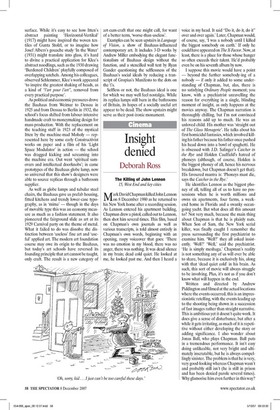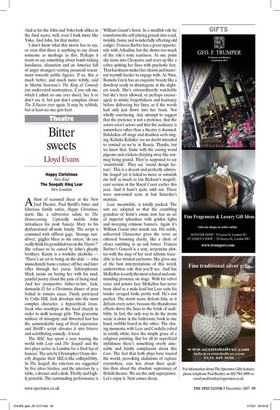Insight denied
Deborah Ross The Killing of John Lennon 15, West End and key cities Mark David Chapman killed John Lennon on 8 December 1980 as he returned to his New York home after a recording session. As Lennon entered his apartment building, Chapman drew a pistol, called out to Lennon, then shot him several times. This film, based on Chapman's own journals as well as various transcripts, is told almost entirely in Chapman's own words, beginning with an opening, raspy voiceover that goes: 'There was no emotion in my blood, there was no anger, there was nothing. It was dead silence in my brain; dead cold quiet. He looked at me, he looked past me. And then I heard a voice in my head. It said "Do it, do it, do it" over and over again.' Later, Chapman would, of course, say, 'I was a nobody until I killed the biggest somebody on earth.' If only he could have appeared on The X-Factor. Now, at least, there is a place for those whose hunger so often exceeds their talent. He'd probably even be on his seventh album by now.
I suppose this movie would have a point — beyond the further somebody-ing of a nobody — if only it added to some understanding of Chapman, but, alas, there is no satisfying Ordinal), People moment; you know, with a psychiatrist unravelling the reason for everything in a single, blinding moment of insight, as only happens at the movies anyway. The Chapman narration is thoroughly chilling, but I'm not convinced his reasons add up to much. He was an unloved child. His mother was 'straight out of The Glass Menagerie'. He talks about his first homicidal fantasies, which involved killing his father because his father once pushed his head down into a bowl of spaghetti. He is obsessed with J.D. Salinger's Catcher in the Rye and Holden Caulfield's hatred of phoneys (although, of course, Holden is the biggest phoney of all, hence his nervous breakdown, but Chapman doesn't get that). His favoured mantra is: 'Phoneys must die, says the Catcher in the Rye.'
He identifies Lennon as the biggest phoney of all, telling all of us to have no possessions when he is worth millions and owns six apartments, four farms, a weekend home in Florida and a swanky oceangoing yacht. But what does all this amount to? Not very much, because the main thing about Chapman is that he is plainly nuts. When Son of Sam, the New York serial killer, was finally caught I remember the press surrounding the first psychiatrist to examine him 'Well?' they all asked insistently. 'Well?' Well,' said the psychiatrist. 'He is simply meshuga.' Chapman's reality is not something any of us will ever be able to share, because it is exclusively his, along with that 'dead quiet cold' in his brain. As such, this sort of movie will always struggle to be involving. Plus, it's not as if you don't know what will happen in the end.
Written and directed by Andrew Piddington and filmed at the actual locations where the events occurred, this is an impressionistic retelling, with the events leading up to the shooting being shown in a succession of fast images rather than straight narrative. This is ambitious yet it doesn't quite work. It does give a sense of disturbance, but after a while it gets irritating, as much of it is repetitive without either developing the story or adding significance. I also wonder about Jonas Ball, who plays Chapman. Ball puts in a tremendous performance. It isn't easy doing unlikeable, not very bright and ultimately inscrutable, but he is always compellingly sinister. The problem is that he is very, very good-looking whereas Chapman wasn't and probably still isn't (he is still in prison and has been denied parole several times). Why glamorise him even further in this way?
And as for the John and Yoko look-alikes in the final scene; well, even I look more like Yoko. And John, for that matter.
I don't know what this movie has to say, or even that there is anything to say about someone as meshuga as this. Perhaps it wants to say something about bomb-ticking loneliness, alienation and an America full of angry strangers venting paranoid resentment towards public figures. If so, this is much better, and much more wittily, said in Martin Scorsese's The King of Comedy (an underrated masterpiece, if you ask me, which I admit no one ever does). See it or don't see it, but just don't complain about The X-Factor ever again. It may be rubbish, but at least no one gets hurt.


























































 Previous page
Previous page